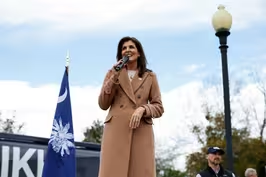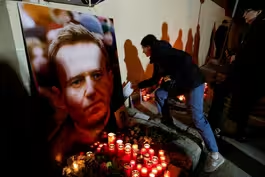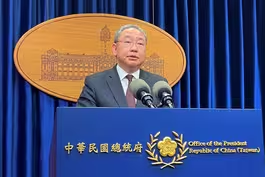
Julian Assange tries to avoid extradition to the U.S.
Clip: 2/20/2024 | 12m 28sVideo has Closed Captions
Wikileaks founder Julian Assange makes last-ditch attempt to avoid U.S. extradition
A two-day hearing in a London court room began Tuesday over the fate of Wikileaks founder Julian Assange. At stake is whether he'll be extradited to the U.S. on espionage charges. Carrie DeCell, a senior staff attorney at the Knight First Amendment Institute, and Jamil Jaffer, a former senior counsel for the House Intelligence Committee, join William Brangham to discuss.
Problems playing video? | Closed Captioning Feedback
Problems playing video? | Closed Captioning Feedback
Major corporate funding for the PBS News Hour is provided by BDO, BNSF, Consumer Cellular, American Cruise Lines, and Raymond James. Funding for the PBS NewsHour Weekend is provided by...

Julian Assange tries to avoid extradition to the U.S.
Clip: 2/20/2024 | 12m 28sVideo has Closed Captions
A two-day hearing in a London court room began Tuesday over the fate of Wikileaks founder Julian Assange. At stake is whether he'll be extradited to the U.S. on espionage charges. Carrie DeCell, a senior staff attorney at the Knight First Amendment Institute, and Jamil Jaffer, a former senior counsel for the House Intelligence Committee, join William Brangham to discuss.
Problems playing video? | Closed Captioning Feedback
How to Watch PBS News Hour
PBS News Hour is available to stream on pbs.org and the free PBS App, available on iPhone, Apple TV, Android TV, Android smartphones, Amazon Fire TV, Amazon Fire Tablet, Roku, Samsung Smart TV, and Vizio.
Providing Support for PBS.org
Learn Moreabout PBS online sponsorshipWILLIAM BRANGHAM: A two-day hearing in a London courtroom began today over the fate of Julian Assange, the founder of WikiLeaks.
At stake is whether he will be extradited to the United States on espionage charges.
His case has reopened debate over whether Assange is a journalist and publisher or something more sinister, and many defending him say free speech and an independent press is also at stake.
This will likely be Julian Assange's last chance to avoid facing prosecutors in the United States.
His two-day hearing got under way today at London's Royal Courts of Justice.
Assange's lawyers are battling to block extradition, which they insist is politically motivated.
American prosecutors want the WikiLeaks founder to stand trial on 17 charges of espionage and one charge for computer misuse for releasing huge troves of classified U.S. military and diplomatic documents back in 2010.
JULIAN ASSANGE, Founder, WikiLeaks: It is clear that it will shape an understanding of what the past six years of war has been like, and that the course of the war needs to change.
The manner in which it needs to change is not yet clear.
WILLIAM BRANGHAM: They say the Australian citizen conspired with U.S. army intelligence analyst Chelsea Manning to steal military files and diplomatic cables.
The Justice Department is also separately investigating whether Assange has ties to the Russian government, especially after WikiLeaks published internal e-mails from the Democratic Party that were stolen by the Russians during the 2016 election.
Today, Assange's wife, Stella, compared his case to that of Russian opposition leader Alexei Navalny, who died in a Russian prison last week.
STELLA ASSANGE, Wife of Julian Assange: It's an attack on all journalists all over the world.
It's an attack on the truth.
And it's an attack on the publics right to know.
Julian is a political prisoner, and his life is at risk.
What happened to Navalny can happen to Julian.
WILLIAM BRANGHAM: Assange's legal troubles also include his arrest by British authorities in 2010 after two women in Sweden accused him of rape and sexual assault.
Two years later, he jumped bail and sequestered himself at the Ecuadorian Embassy in London, where he stayed around the clock for seven years.
JULIAN ASSANGE: As WikiLeaks stands under threat, so does the freedom of expression and the health of all our societies.
WILLIAM BRANGHAM: The tiny Ecuadorian Mission eventually evicted him in 2019.
And British police immediately arrested him for his bail violation years before.
He's been held in a maximum security prison in London ever since.
Assange's supporters rallied outside the court today, demanding his release, and hailing him as a whistle-blower who exposed U.S. military wrongdoings in the wars in Iraq and Afghanistan.
SADIA KOKNI, Julian Assange Supporter: Assange, for us and for me, he is a hero.
He's an advocate for truth, peace, justice.
It's really important that he's free, not just for journalism, but for everyone that's actually walking this planet.
His work affects us, because he's exposing injustices throughout the world.
WILLIAM BRANGHAM: Should the British court reject his appeal, Assange could be sent to the U.S. immediately to stand trial.
If convicted, he faces up to 175 years in prison.
For a closer look at Julian Assange's appeal and the U.S. effort to prosecute him, we get two views.
Carrie DeCell is a senior staff attorney at the Knight First Amendment Institute.
Her litigation focuses on freedom of speech on social media and digital age threats to freedom of the press.
And Jamil Jaffer, he's a former senior counsel for the House Intelligence Committee who also served in the Justice Department's National Security Division during the George W. Bush administration.
Thank you both so much for being here.
Carrie, to you first.
As I mentioned in that setup there, Assange could be facing 175 years if he were convicted on all of these charges.
Do you think he should face prosecution here in the United States?
CARRIE DECELL, Senior Staff Attorney, Knight First Amendment Institute: No, I don't.
I think regardless of whether or not the U.K. courts decide to extradite him to the United States, the U.S. Justice Department should drop these charges.
They are a direct threats to press freedom here because they could be brought against any national security reporter worth their salt.
WILLIAM BRANGHAM: Jamil, what do you have to say about that?
What is -- is he a journalist?
Is he a publisher, as his defenders allege?
JAMIL JAFFER, Former Senior Counsel, House Intelligence Committee: Well, a couple of things, William.
One, these charges haven't been brought against any journalist ever in the United States, because Julian Assange isn't a real journalist.
He never has been.
He's been a hacker his whole life.
He doesn't engage in the normal course of journalistic ethics.
He doesn't redact sources.
He doesn't try to protect the innocent, right?
In fact, all of his disclosures have resulted in more journalists and more human rights activists being under threat abroad than ever before.
It's his disclosures that have put those very people, legitimate journalists, at risk.
WILLIAM BRANGHAM: And, Carrie, what do you make of that, that there is a distinction here that he, in one case, helped someone hack into a computer?
That is not what a normal national security reporter would do.
CARRIE DECELL: That may be right, but that's one count of an 18-count superseding indictment.
The Justice Department could have left the charges against him at that one count, but they filed an indictment adding 17 counts under the Espionage Act.
And the charges under the Espionage Act are for things that typical journalists engage in every day.
It's soliciting information from confidential sources, obtaining that information, and then publishing it.
So, regardless of whether or not Assange himself qualifies as a journalist, it doesn't matter when it comes to this particular prosecution, because these charges could be brought against your average journalist.
WILLIAM BRANGHAM: Jamil, I wonder if you would help -- your take on this distinction between being a journalist and between being a hacker, as he says.
Does he fall under the First Amendment in any way, in your mind?
JAMIL JAFFER: Well, one, he's not a U.S. citizen, so he doesn't actually have rights from the U.S. Constitution.
Now, he's being brought here, prosecuted here.
Presumably, those rights will apply once he's here and in our courts.
But having published from abroad, he doesn't actually have First Amendment rights.
That being said, even if we apply the First Amendment to him, he doesn't do the things that you would expect a journalist to do.
He doesn't comply with journalistic ethics.
He doesn't abide by these things.
In fact, the whole reason Ecuadorian Embassy kicked him out after seven years is, he was behaving poorly while there.
On top of all that, even if you put aside the hacking charges, right, journalists don't normally solicit classified information in the sense of like, go get this specific information out of a classified database.
If they receive it, sometimes, they will publish it.
But even when they publish it, they take efforts to redact information that is sensitive, protect sources of methods and the like, give the government a chance to respond.
Julian Assange didn't do any of that, because he's not a real, legitimate journalist.
And the idea that this prosecution would undermine any journalist's rights, it just makes no sense to me.
WILLIAM BRANGHAM: Carrie, I'm sure you share this concern that many of his supporters and his lawyers have, which is that he would have a very difficult time getting a fair trial in the U.S. Do you believe that's the case?
CARRIE DECELL: You know, I mean, I'm a U.S. lawyer and I practice in U.S. courts, and I do still believe that the U.S. courts can proceed through a fair trial.
But, that said, there are a lot of circumstances around this particular prosecution that are terribly concerning.
And, as Mr. Jaffer mentioned previously, this really is the first prosecution of a publisher of information under the Espionage Act, regardless of whether or not he qualifies as a journalist.
And I think there are a lot of questions, open questions, that the courts will have to address if he's successfully extradited here.
And the biggest, to my mind, is whether or not there are First Amendment limits on his and other publishers' potential liability for publishing truthful information on matters of clear public concern when it comes to the Espionage Act.
WILLIAM BRANGHAM: And, Jamil, we should remind our audience that, back in 2019, the Obama administration was presented with this option of prosecuting Assange, and they chose not to.
Do you have an understanding as to why they chose not to?
JAMIL JAFFER: You know, I'm not exactly sure why they declined prosecution at the time, but, of course, since then, the Trump administration has brought the charges.
They brought a second superseding indictment.
And those charges have continued to be prosecuted by the Biden administration after a change in administration, a Biden administration that, by the way, most of the people in the Justice Department and the National Security Council served in, in the prior Obama administration, including Merrick Garland, who was nominated to be -- nominated to the Supreme Court by President Obama, right, Lisa Monaco, the deputy attorney general, the head of the National Security Division.
Matt Olsen was the head of the National Counterterrorism Center.
So the same people who are prosecuting Julian Assange today served in similar or related positions back in the Obama administration as well.
WILLIAM BRANGHAM: so, Carrie, what would you argue there, that, if the administration back then, the Obama administration, you believe, made the right call, why do you think that they have changed course now?
CARRIE DECELL: Yes, well, I mean, as reported at the time, apparently, the Obama administration was really concerned about its own inability to draw a line between Assange and journalists when it comes to what they intended to prosecute him for in this instance.
And the Trump administration clearly made a different decision, probably not least because the Trump administration was not at all concerned about jeopardizing freedom of the press and, in fact, was excited, I think, about the possibility of putting the press on notice.
It's, I think, a typical Justice Department practice of maintaining prosecutions that a previous administration filed, really for the appearance of impartiality.
And I think, in this case, however, the charges should not have been brought by the Trump administration.
And the Obama administration was right not to bring those very same charges when it had the opportunity to.
So I think this Justice Department should drop those charges.
WILLIAM BRANGHAM: Jamil Jaffer, what do you make of the separate allegations that are made that Assange has some unhealthy connection to Russia, that he basically served as a far-too-willing conduit for those stolen e-mails back in 2016 from the DNC?
JAMIL JAFFER: Well, William, we have seen that play out in real time.
We have seen it play out during -- during that particular incident, but many times as well where it appears that Assange has this somewhat inappropriate relationship with the Russian regime.
He seems to be parroting Russian talking points oftentimes.
It's hard to know exactly how those ties play out.
They're not indicted.
They're not part of the charges.
But it appears to be part of what's underlying all this.
And it's not surprising in the context of what we have seen the Russians do in terms of election misinformation, disinformation, and their efforts to manipulate Western and -- Western audiences.
So this wouldn't be surprising as a Russian tactic.
Whether it's accurate or not really doesn't matter to the prosecution, because, at the end of the day, what Julian Assange is accused of doing, if he's found guilty in a court of law, is prosecutable and is punishable at U.S. law and has been since 1917.
WILLIAM BRANGHAM: Carrie, lastly to you, the -- what happens next?
Let's just say he is extradited or the court rules against him and says he could be.
Does he have another route for appeal?
CARRIE DECELL: Well, in the United Kingdom, my understanding is that he would next have to go to the European Court of Human Rights, and that he might be even put on a plane in the meantime to the United States.
But, certainly, within the United States, he would have the opportunity to argue that he should not be held criminally liable for publishing information, again, truthful information matters of clear public concern.
And the Supreme Court has held that the First Amendment strongly protects that kind of publication.
Now, it hasn't done so in this particular context.
But Assange and his lawyers, I would hope, would make a vigorous First Amendment defense to these charges.
WILLIAM BRANGHAM: All right, Carrie DeCell and Jamil Jaffer, thank you so much, both of you, for being here.
CARRIE DECELL: Thank you.
JAMIL JAFFER: Thanks.
Exhibit chronicles rich history of independent Black cinema
Video has Closed Captions
Clip: 2/20/2024 | 6m 43s | Exhibit chronicles rich history of independent Black cinema (6m 43s)
Haley vows to stay in 2024 race as Biden prepares for Trump
Video has Closed Captions
Clip: 2/20/2024 | 5m 35s | Haley vows to stay in 2024 presidential race as Biden prepares for Trump (5m 35s)
Low demand for commercial office space fuels economic fears
Video has Closed Captions
Clip: 2/20/2024 | 8m 10s | Low demand for commercial office space fuels economic fears (8m 10s)
A Minnesota shooting and the U.S. domestic violence problem
Video has Closed Captions
Clip: 2/20/2024 | 6m 25s | Deadly Minnesota shooting sheds light on nation's growing domestic violence problem (6m 25s)
News Wrap: Biden to impose new sanctions after Navalny death
Video has Closed Captions
Clip: 2/20/2024 | 4m 59s | News Wrap: Biden to impose major sanctions on Russia in response to Navalny's death (4m 59s)
Taiwan's top diplomat in the U.S. on tensions with China
Video has Closed Captions
Clip: 2/20/2024 | 8m 19s | Taiwan’s top diplomat in Washington discusses U.S. relations and tensions with China (8m 19s)
Providing Support for PBS.org
Learn Moreabout PBS online sponsorship
- News and Public Affairs

FRONTLINE is investigative journalism that questions, explains and changes our world.

- News and Public Affairs

Amanpour and Company features conversations with leaders and decision makers.












Support for PBS provided by:
Major corporate funding for the PBS News Hour is provided by BDO, BNSF, Consumer Cellular, American Cruise Lines, and Raymond James. Funding for the PBS NewsHour Weekend is provided by...





